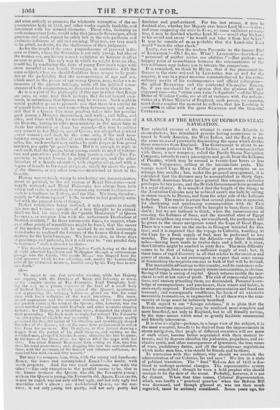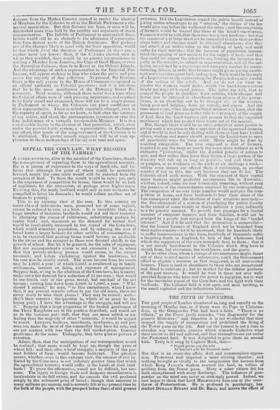A GLANCE AT THE RESULTS OF IMPROVED STEArt: NAVIGATION.
THE splendid success of the attempt to cross the Atlantic in steam-packets, has stimulated persons having connexions or in- terest in South America, the West Indies, and the East, to use the same means of practically diminishing the space which divides those countries from England. The Government is about to es- tablish steam-packets to the West Indies ; and in communication with these, a new company, called the Pacific Steam Navigation Company, intends to carry passengers and goods from the Isthmus of Panama, which may be crossed in twenty-four hours or less time, to Valaparaiso, calling at the intermediate ports. The voyage round Cape Horn to Callao at present occupies on an average four mouths ; but, under the proposed arrangement, it is calculated that the distance may be accomplished in thirty days. The South American States have granted this company exclusive privileges for ten years, and the British Government have promised it a royal charter. It is manifest that the length of the voyage to the Australian Colonies may be reduced nearly one half, by sailing in steam-vessels to Darien, and from the other side of the Isthmus to Sydney. The reader is aware that several plans are in agitation fur shortening and quickening communication with the East Indies. That some of these will be brought to bear, there is little doubt ; but we are inclined to think, when the inconvenience of crossing time Isthmus of Suez, and the unsettled state of Egypt and the neighbouring countries, are considered, the preference will be given to the steam navigation round the Cape of Good Hope. There is a vessel now on the stocks in Glasgow intended for this line; and it is expected that the voyage to Calcutta, touching at the Cape for a fresh supply of fuel, may be performed in two months. The passage across the Atlantic—say three thousand miles—having been made in twelve days and a half, it is clear, that Calcutta might be reached in sixty days. The main difficulty seems to be that of taking a sufficient supply of coal; but, in these times of rapid discovery in all that relates to the creation and
power of steam, it is not extravagant to expect that some means of diminishing the requisite amount or bulk of fuel will be devised. The mercantile advantage to this country, and its customers colo- nial and foreign, from a more speedy intercommunication, is obvious. Saving of time is saving of capital. Quick returns enable the mer- chant to sell at low rates of profit. The risk of commercial specula- tions, and anxiety attending them, are diminished. Personal know- ledge of correspondents and purchasers, their wants and habits, is moro easily acquired. Facilities for misrepresentation and fraud are lessened ; and consequently confidence, the basis of all extensive mercantile transactions, is augmented. In all these ways the com- munity at large must be indirectly benefited.
With regard to our " foreign relations," it is plain that the British maritime superiority may be rendered more complete and
more beneficial, not only to England, but to all friendly nations, by the same means which must so greatly facilitate commercial and friendly intercourse. It is also nu slight—perhaps, in a large view of the subject, it is the most essential, benefit to be derived from the improvements in steam navigation, that people of different countries will see more of each other, become better acquainted with their mutual in- terests, and by degrees abandon the jealousies, prejudices, and ex-
clusive spirit, and other consequences of ignorance, the true cause of wars, prohibitory duties, and all the mischievous regulations which make men foes, who should be friends and brothers.
In connexion with this subject, why should we overlook the administration of our Colonies, far and near ? We live in a state
of political transition. The " final" Reform Act of 1832 is des- tined to undergo material changes. The representative system must be remodelled ; though he were a bold prophet who should
venture to fix the date of the event. Probably, however, it is not
far distant. When that time comes, Colonial Representation, which was hardly a " practical question" when the Reform Bill
was discussed, and though glanced at, was not then much regarded, must be seriously considered. Seven years ago, the
distance from the Mother Country seemed to render the election of Members for the Colonies to sit in the British Parliament a chi- merical speculation. But that distance has been, or soon will be, diminished more than half by the rapidity and regularity of steam communication. The liability of Parliament to unexpected disso- lutions would still be an obstacle to the admission of representa- tives from distant parts of the British dominions. But perhaps one of the changes likely to meet with the least opposition, would Le that which fixed the duration of Parliament at three years, eeither more nor fewer: then, if the Colonies elected men in whom they confided, there would be no greater inconvenience in sending a Member from Jamaica, the Cape of Good Hope, or even the Australian Colonies, than from Kerry or the Orkney Islands. And the advantage of such a representation in the Imperial Par- liament, will appear striking to him who takes the pains and pos- sesses the capacity of due reflection. At present, Sir GeneGe GREY is the only rerson in the House of Commons recognized as an official authority on Colonial questions ; and it is notorious that lie is the mere mouthpiece of the Downing Street Bu- reaucracy. Next session, although there never was a time when the Colonial affairs were of such pressing importance, aad required to be fairly stated and examined, there will not lie a single person in Parliament in whom the Colonists can place confidence as their representative. There is nobody especially charged, even in the capacity of agent, as far as we know, to look after the interests of any colony, and check the presumptuous ignorance or spur the lazy indifference of a virtually irresponsible Minister. It is in a considerable degree to the absence of that protection, which, even under the present faulty system, a representative in Parliament can affinel, that much of the misgovernment of the Colonies is to he attributed. The partial remedy suggested will be of easy ap- plication in these modern days of victory over time and space.



























 Previous page
Previous page